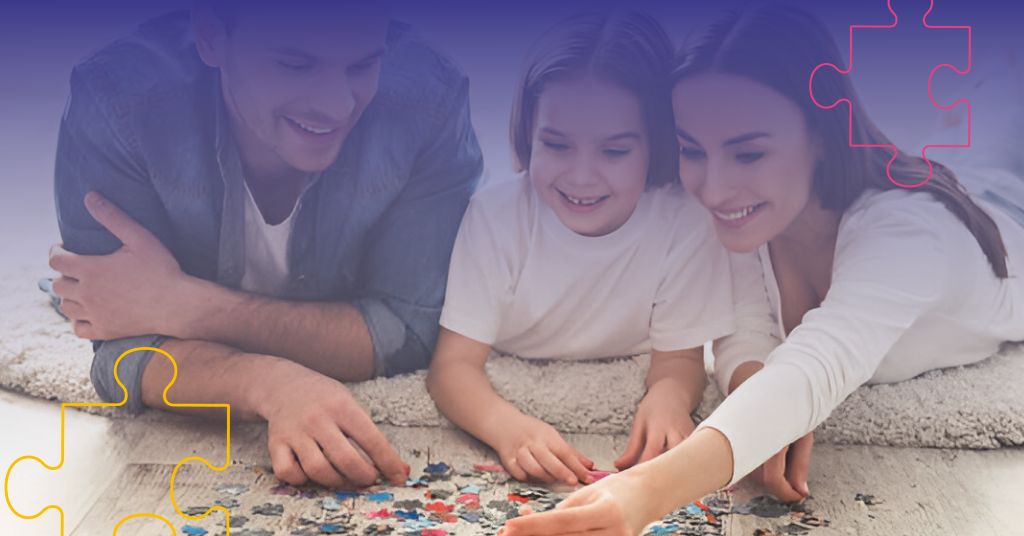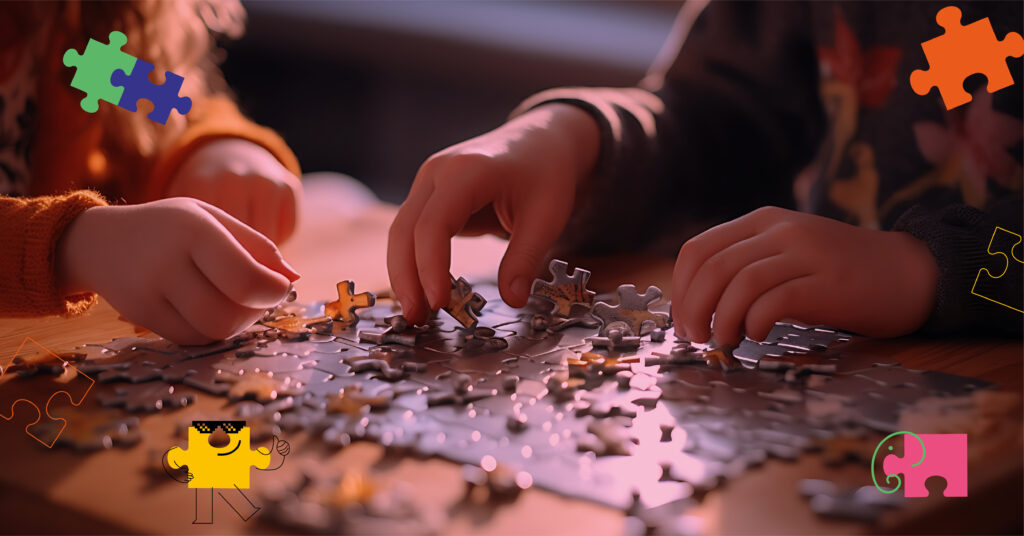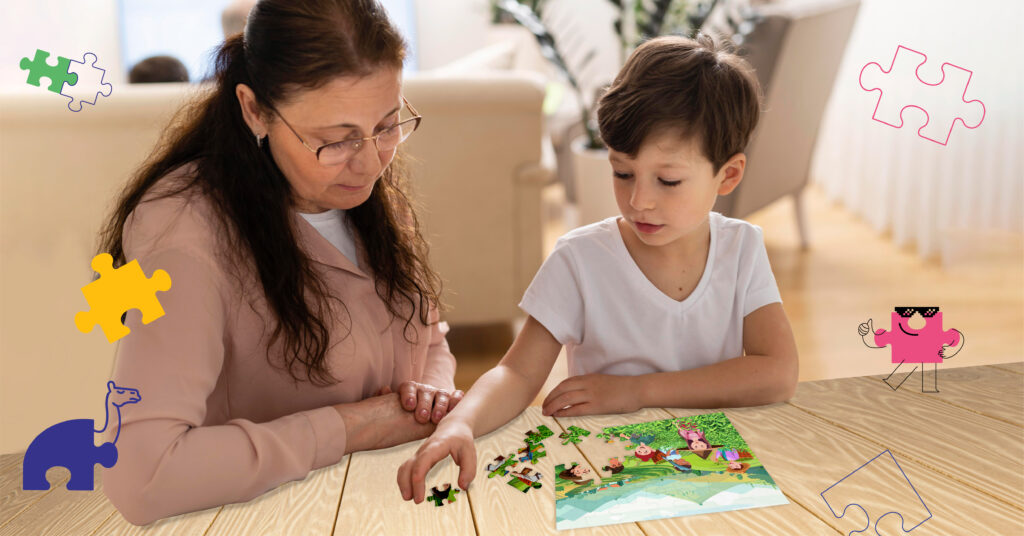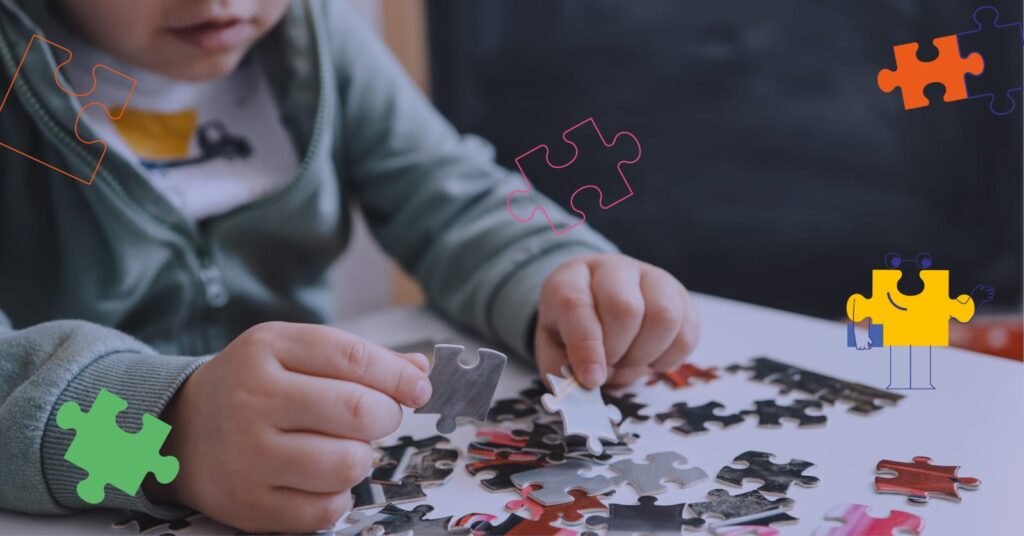In an age where screens dominate children’s playtime, finding alternative activities that are both educational and entertaining is crucial. One such activity is puzzling. Jigsaw puzzles for kids, along with other types of puzzle games, offer a myriad of benefits that go beyond mere entertainment. Here are seven surprising ways puzzles are good for your child.
Also Read: Puzzle Subscription Plan for Kids in Gurugram
1. Enhancing Cognitive Skills
Jigsaw puzzles for kids are more than just a fun pastime; they are a fantastic way to boost cognitive development. When children work on puzzles, they engage in a mental exercise that enhances their memory, concentration, and reasoning skills. Puzzles require kids to recall shapes, colors, and patterns to complete the image, thus improving their short-term memory. Furthermore, the process of figuring out where each piece fits helps in developing critical thinking and problem-solving skills, essential for academic success.
2. Developing Fine Motor Skills
Handling puzzle pieces is an excellent way for children to develop fine motor skills and hand-eye coordination. Picking up, manipulating, and placing pieces in the correct spots require a degree of precision that strengthens the small muscles in their hands and fingers. This improved dexterity is not only beneficial for writing and drawing but also for daily tasks such as tying shoelaces or buttoning a shirt. Thus, engaging in puzzle games can provide foundational skills for various physical activities.
3. Fostering Problem-Solving Abilities
Why puzzling is often recommended by educators and child development experts lies in its ability to foster problem-solving abilities. When children work on puzzles, they learn to identify problems and experiment with solutions. This process involves critical thinking as they try different strategies to see what works best. The trial-and-error method helps children understand that persistence and patience are key to overcoming challenges. These skills are invaluable and translate well to real-life situations where problem-solving is essential.
4. Promoting Patience and Persistence
One of the significant benefits of puzzle games is that they teach children the virtues of patience and persistence. Completing a puzzle is not an instant gratification activity; it requires time and effort. Children learn to be patient as they work through the puzzle and experience a sense of achievement upon completing it. This persistence can build resilience, teaching them that hard work and dedication pay off. The sense of accomplishment also boosts their confidence and motivates them to take on more challenging tasks.
5. Encouraging Social Interaction
Puzzles can also be a social activity that encourages interaction and teamwork. When children work on puzzles together, they communicate, share ideas, and collaborate to achieve a common goal. This teamwork fosters social skills such as cooperation, negotiation, and shared decision-making. Group puzzle activities can be an excellent way for children to bond with family members or friends, enhancing their social development and creating lasting memories.
6. Boosting Self-Esteem
The sense of accomplishment that comes with completing a puzzle can significantly boost a child’s self-esteem. Successfully fitting the final piece into place provides a tangible reward for their effort, reinforcing a positive self-image. This boost in confidence encourages children to take on new challenges and believe in their abilities. It also teaches them that persistence and effort lead to success, which is a valuable life lesson.
7. Stimulating Imagination and Creativity
Jigsaw puzzles for kids are a great way to stimulate imagination and creativity. The process of envisioning the final picture and figuring out how to achieve it requires creative thinking. Children learn to see patterns and connections, which can spark their imagination. Moreover, puzzles with themes such as animals, landscapes, or fairy tales can inspire children to create stories and scenarios, further enhancing their creative thinking.
All in all, jigsaw puzzles for kids and other puzzle games are not just simple toys; they are powerful tools for child development. They enhance cognitive skills, develop fine motor abilities, foster problem-solving skills, promote patience and persistence, encourage social interaction, boost self-esteem, and stimulate imagination and creativity. By incorporating puzzles into your child’s playtime, you are providing them with a fun activity that offers numerous developmental benefits. So, the next time you wonder why puzzling is beneficial, remember these surprising ways puzzles can positively impact your child’s growth and learning.
Explore the wide variety of jigsaw puzzles for kids available and subscribe to our Puzzle Subscription in Gurugram, Haryana. Start incorporating puzzle time into their daily routine and witness the amazing benefits unfold. Happy puzzling!



